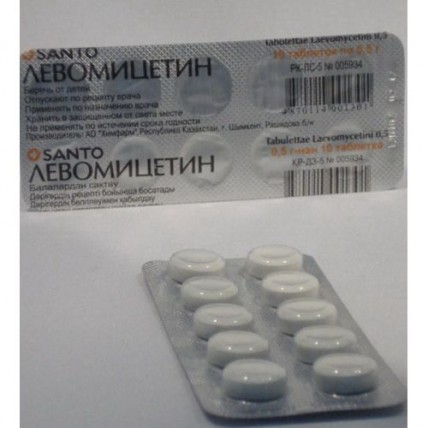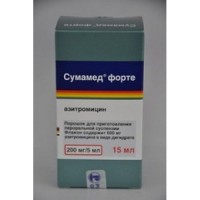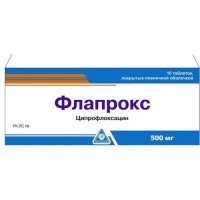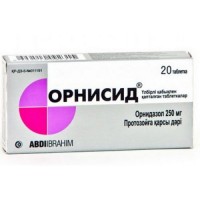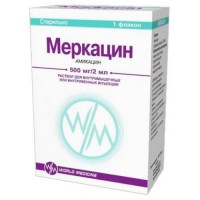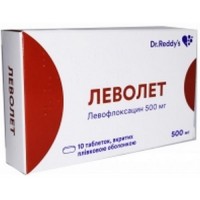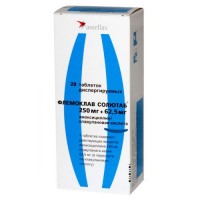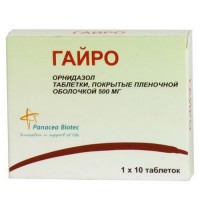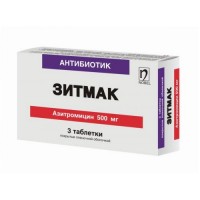Chloramphenicol 500 mg (10 tablets)
- $2.70
The instruction for use
of medicine for experts
Levomycetinum
the Trade name
Levomycetinum
the International unlicensed
name Chloramphenicol Dosage Form
of the Tablet of 500 mg
Structure
One tablet contains
active agent – chloramphenicol of 500.0 mg,
excipients: microcrystalline cellulose of 28.7 mg, a hydroksipropilmetiltsellyuloz of 6.5 mg, sodium of starch glikolit 9.3 mg, calcium stearate of 5.5 mg.
Description
of the Tablet of color, white or white with weak yellowish shade. On one party of a tablet there is a facet and risk, on another – a facet and a signature logo in the form of a cross.
Pharmacotherapeutic group
Antimicrobial drugs for system use. Amfenikola
Kod
the Pharmacological
Pharmacokinetics Later properties of intake levomycetinum is quickly and completely soaked up by automatic telephone exchange of J01BA01 from digestive tract. The bioavailability is 80%. It is quickly distributed in an organism. Linking with proteins of plasma makes 50-60%. It is metabolized in a liver. Elimination half-life makes 1.5-3.5 hours. It is removed with urine, small amounts with a stake and bile.
Pharmacodynamics
Antibiotic of a broad spectrum of activity. The mechanism of antimicrobial effect of levomycetinum is connected with disturbance of protein synthesis of microorganisms. Has bacteriostatic action. It is active concerning gram-positive bacteria: Staphylococcus spp., Streptococcus spp., gram-negative bacteria: Neisseria gonorrhoeae, Neisseria meningitidis, Escherichia coli, Haemophilus influenzae, Salmonella spp., Shigella spp., Klebsiella spp., Serratia spp., Yersinia spp., Proteus spp., Rickettsia spp., is active also concerning Spirochaetaceae, some large viruses. Levomycetinum is active concerning the strains resistant to penicillin, streptomycin, streptocides. Levomycetinum resistance of microorganisms develops rather slowly.
Indications
- the infectious and inflammatory diseases caused by microorganisms, sensitive to levomycetinum, including: the typhoid, a paratyphoid, dysentery, a generalized form of a salmonellosis, a brucellosis, a tularemia, whooping cough, a sapropyra and other rickettsial diseases
- meningitis
- brain abscess
- pneumonia
- sepsis
- osteomyelitis
- infections of bodies of a small pelvis
- clamidiosis
At the infectious processes of other etiology caused by the activators sensitive to effect of levomycetinum, drug is shown in case of inefficiency of other chemotherapeutic means.
A route of administration and doses
Inside, in 30 minutes prior to food (in case of nausea or vomiting – in an hour after a meal).
A single dose for adult 0.25-0.5 g (1/2-1tab.), daily-2 (the 4th tab.). In especially hard cases (a typhoid, peritonitis and others) it is possible to appoint drug in a dose to 4 g (the 8th tab.) in day (under strict observation of the doctor and control of a condition of blood and function of kidneys).
The single dose for children up to 3 years of 10-15 mg/kg, of 3-8 years 0.15-0.2 g, is more senior than 8 years 0.2-0.3 g, frequency rate of use 3-4 times a day.
The course of treatment makes 7-10 days.
Side effects
- thrombocytopenia, a leukopenia, an agranulocytosis, aplastic anemia
- nausea, vomiting, diarrhea, a meteorism, dysbacteriosis
- a glossitis, stomatitis, in some cases damage of a liver, a superinfetion
Seldom
- peripheral neuritis, an optic neuritis
- a headache, a depression, confusion of consciousness, a delirium, visual and auditory hallucinations, paralysis of eyeballs, disturbance of taste
- skin rash, a small tortoiseshell, a Quincke's disease.
Contraindications
- blood diseases
- the profound abnormal liver functions
- deficiency of enzyme glyukozo-6-fosfatdegidrogenazy
- a skin disease (psoriasis, eczema, fungus diseases)
- pregnancy, the lactation period
- children's age up to 4 weeks (newborns)
- the hypersensitivity to levomycetinum
Medicinal interactions
At simultaneous use of levomycetinum with oral hypoglycemic drugs is noted strengthening of hypoglycemic action due to suppression of metabolism of these drugs in a liver and increases in their concentration in blood plasma. At simultaneous use with the drugs oppressing a marrowy hemopoiesis strengthening of the oppressing action on marrow is noted. At simultaneous use with erythromycin, clindamycin, lincomycin the mutual weakening of action is noted. At use with penicillin levomycetinum counteracts manifestation of bactericidal effect of penicillin. Levomycetinum suppresses the fermental system of P450 cytochrome therefore at simultaneous use with phenobarbital, Phenytoinum, warfarin note weakening of metabolism of these drugs, delay of removal and increase in their concentration in blood plasma.
The special
instructions Levomycetinum do not apply at newborns as development of a gray syndrome is possible (a meteorism, nausea, a hypothermia, gray-blue skin color, the progressing cyanosis, dispnoe, cardiovascular insufficiency). With care apply at the patients receiving earlier treatment by cytostatic drugs or radiation therapy. At a concomitant use of alcohol the development of disulfiramovy reaction (hyperaemia of integuments, tachycardia, nausea, vomiting, reflex cough, spasms) is possible.
In the course of treatment the systematic control of a picture of peripheral blood is necessary.
Features of influence of medicine on ability to run the vehicle or potentially dangerous mechanisms
Considering side effects of medicine, it is necessary to be careful at control of motor transport and moving mechanisms
Overdose
Symptoms – strengthening of side effects
Treatment - symptomatic.
A form of release and packing
of the Tablet of 500 mg on 10 pieces in blister strip packaging with the instruction for use.
To Store storage conditions in dry, protected from light, the place at a temperature from + 20C to + 300C.
To store out of children's reach!
An expiration date
of 5 years
After an expiration date not to use drug.
Prescription status
According to the prescription
the Producer: JSC Khimpharm, Shymkent, REPUBLIC OF KAZAKHSTAN, Rashidov St.,/N, ph.: 560882
of medicine for experts
Levomycetinum
the Trade name
Levomycetinum
the International unlicensed
name Chloramphenicol Dosage Form
of the Tablet of 500 mg
Structure
One tablet contains
active agent – chloramphenicol of 500.0 mg,
excipients: microcrystalline cellulose of 28.7 mg, a hydroksipropilmetiltsellyuloz of 6.5 mg, sodium of starch glikolit 9.3 mg, calcium stearate of 5.5 mg.
Description
of the Tablet of color, white or white with weak yellowish shade. On one party of a tablet there is a facet and risk, on another – a facet and a signature logo in the form of a cross.
Pharmacotherapeutic group
Antimicrobial drugs for system use. Amfenikola
Kod
the Pharmacological
Pharmacokinetics Later properties of intake levomycetinum is quickly and completely soaked up by automatic telephone exchange of J01BA01 from digestive tract. The bioavailability is 80%. It is quickly distributed in an organism. Linking with proteins of plasma makes 50-60%. It is metabolized in a liver. Elimination half-life makes 1.5-3.5 hours. It is removed with urine, small amounts with a stake and bile.
Pharmacodynamics
Antibiotic of a broad spectrum of activity. The mechanism of antimicrobial effect of levomycetinum is connected with disturbance of protein synthesis of microorganisms. Has bacteriostatic action. It is active concerning gram-positive bacteria: Staphylococcus spp., Streptococcus spp., gram-negative bacteria: Neisseria gonorrhoeae, Neisseria meningitidis, Escherichia coli, Haemophilus influenzae, Salmonella spp., Shigella spp., Klebsiella spp., Serratia spp., Yersinia spp., Proteus spp., Rickettsia spp., is active also concerning Spirochaetaceae, some large viruses. Levomycetinum is active concerning the strains resistant to penicillin, streptomycin, streptocides. Levomycetinum resistance of microorganisms develops rather slowly.
Indications
- the infectious and inflammatory diseases caused by microorganisms, sensitive to levomycetinum, including: the typhoid, a paratyphoid, dysentery, a generalized form of a salmonellosis, a brucellosis, a tularemia, whooping cough, a sapropyra and other rickettsial diseases
- meningitis
- brain abscess
- pneumonia
- sepsis
- osteomyelitis
- infections of bodies of a small pelvis
- clamidiosis
At the infectious processes of other etiology caused by the activators sensitive to effect of levomycetinum, drug is shown in case of inefficiency of other chemotherapeutic means.
A route of administration and doses
Inside, in 30 minutes prior to food (in case of nausea or vomiting – in an hour after a meal).
A single dose for adult 0.25-0.5 g (1/2-1tab.), daily-2 (the 4th tab.). In especially hard cases (a typhoid, peritonitis and others) it is possible to appoint drug in a dose to 4 g (the 8th tab.) in day (under strict observation of the doctor and control of a condition of blood and function of kidneys).
The single dose for children up to 3 years of 10-15 mg/kg, of 3-8 years 0.15-0.2 g, is more senior than 8 years 0.2-0.3 g, frequency rate of use 3-4 times a day.
The course of treatment makes 7-10 days.
Side effects
- thrombocytopenia, a leukopenia, an agranulocytosis, aplastic anemia
- nausea, vomiting, diarrhea, a meteorism, dysbacteriosis
- a glossitis, stomatitis, in some cases damage of a liver, a superinfetion
Seldom
- peripheral neuritis, an optic neuritis
- a headache, a depression, confusion of consciousness, a delirium, visual and auditory hallucinations, paralysis of eyeballs, disturbance of taste
- skin rash, a small tortoiseshell, a Quincke's disease.
Contraindications
- blood diseases
- the profound abnormal liver functions
- deficiency of enzyme glyukozo-6-fosfatdegidrogenazy
- a skin disease (psoriasis, eczema, fungus diseases)
- pregnancy, the lactation period
- children's age up to 4 weeks (newborns)
- the hypersensitivity to levomycetinum
Medicinal interactions
At simultaneous use of levomycetinum with oral hypoglycemic drugs is noted strengthening of hypoglycemic action due to suppression of metabolism of these drugs in a liver and increases in their concentration in blood plasma. At simultaneous use with the drugs oppressing a marrowy hemopoiesis strengthening of the oppressing action on marrow is noted. At simultaneous use with erythromycin, clindamycin, lincomycin the mutual weakening of action is noted. At use with penicillin levomycetinum counteracts manifestation of bactericidal effect of penicillin. Levomycetinum suppresses the fermental system of P450 cytochrome therefore at simultaneous use with phenobarbital, Phenytoinum, warfarin note weakening of metabolism of these drugs, delay of removal and increase in their concentration in blood plasma.
The special
instructions Levomycetinum do not apply at newborns as development of a gray syndrome is possible (a meteorism, nausea, a hypothermia, gray-blue skin color, the progressing cyanosis, dispnoe, cardiovascular insufficiency). With care apply at the patients receiving earlier treatment by cytostatic drugs or radiation therapy. At a concomitant use of alcohol the development of disulfiramovy reaction (hyperaemia of integuments, tachycardia, nausea, vomiting, reflex cough, spasms) is possible.
In the course of treatment the systematic control of a picture of peripheral blood is necessary.
Features of influence of medicine on ability to run the vehicle or potentially dangerous mechanisms
Considering side effects of medicine, it is necessary to be careful at control of motor transport and moving mechanisms
Overdose
Symptoms – strengthening of side effects
Treatment - symptomatic.
A form of release and packing
of the Tablet of 500 mg on 10 pieces in blister strip packaging with the instruction for use.
To Store storage conditions in dry, protected from light, the place at a temperature from + 20C to + 300C.
To store out of children's reach!
An expiration date
of 5 years
After an expiration date not to use drug.
Prescription status
According to the prescription
the Producer: JSC Khimpharm, Shymkent, REPUBLIC OF KAZAKHSTAN, Rashidov St.,/N, ph.: 560882
